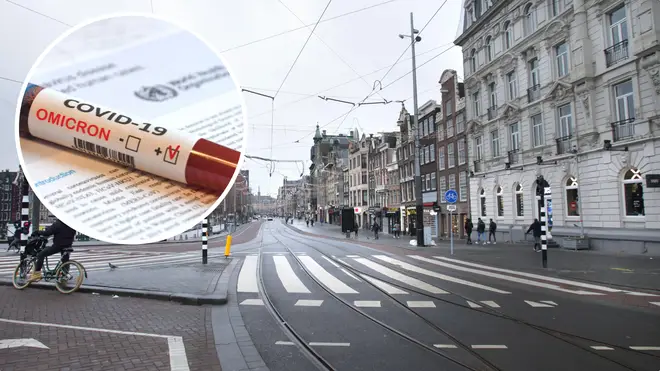
Clive Bull 1am - 4am
18 December 2021, 19:44 | Updated: 18 December 2021, 19:54

The Netherlands is entering a strict lockdown from Sunday, set to last until at least January 14.
Schools, universities, and all non-essential stores, bars and restaurants in the Netherlands will be closed, prime minister Mark Rutte said Saturday night.
Residents will only be permitted two visitors except for Christmas and New Year's, when four will be allowed, he said.
"The Netherlands is going into lockdown again from tomorrow," Mr Rutte said, adding that the move was "unavoidable because of the fifth wave caused by the Omicron variant that is bearing down on us".
Read more: Met 'aware' of video appearing to show officer push over one-legged man at anti-vax demo
Read more: Major incident declared in London as 'worrying' number of frontline staff have Omicron
In the Netherlands, anticipation a government meeting on Saturday would result in tougher restrictions caused shoppers to swarm commercial areas of Dutch cities, fearing it would be their last chance to buy Christmas gifts.
Rotterdam municipality tweeted that it was "too busy in the centre" of the port city and told people: "Don't come to the city."
Amsterdam also warned that the city's main shopping street was busy and urged people to stick to coronavirus rules.

Major incident declared in London amid Omicron spread
The Netherlands joins a number of European countries introducing new measures in response to the new strain of coronavirus, which first emerged in South Africa last month.
France, Cyprus and Austria tightened travel restrictions, and Denmark closed theatres, concert halls, amusement parks and museums.
Ireland imposed an 8pm curfew on pubs and bars and limited attendance at indoor and outdoor events.

Expert breaks down ways you can lessen risk of covid over Christmas
The World Health Organisation (WHO) reported on Saturday that the Omicron variant had been detected in 89 countries.
It also said cases involving the strain are doubling every 1.5-3 days in places with community transmission - for example, the UK.
Read more: Omicron: Tougher restrictions needed to stop hospital admissions soaring, scientists warn
Read more: Biden's Covid vaccine mandate reinstated for large US businesses
There are a number of unanswered questions about the strain, including how effective existing vaccines are against it and whether the variant produces severe illness in many infected individuals.
But the UN health agency said Omicron's "substantial growth advantage" over the Delta variant means it is likely to quickly overtake Delta as the dominant form of the virus in countries where it is spreading locally.